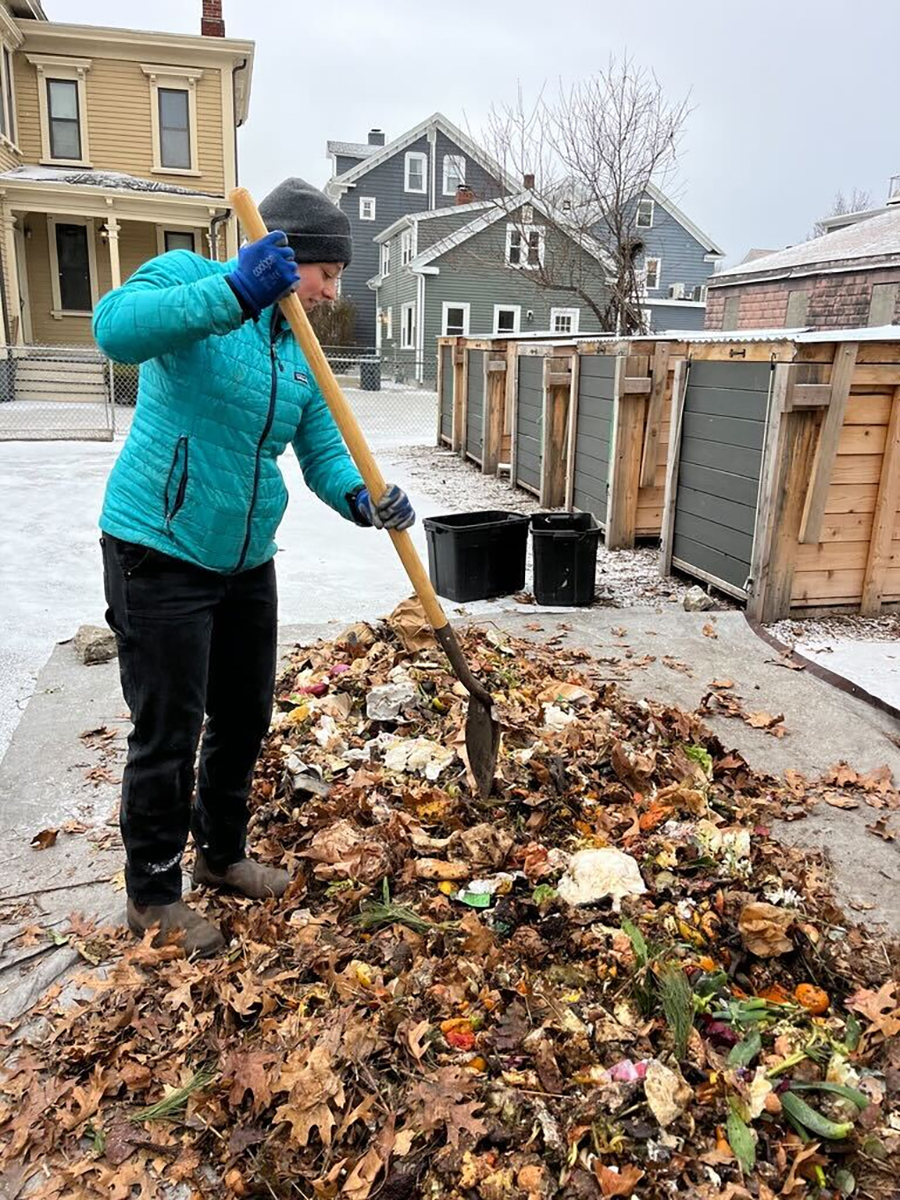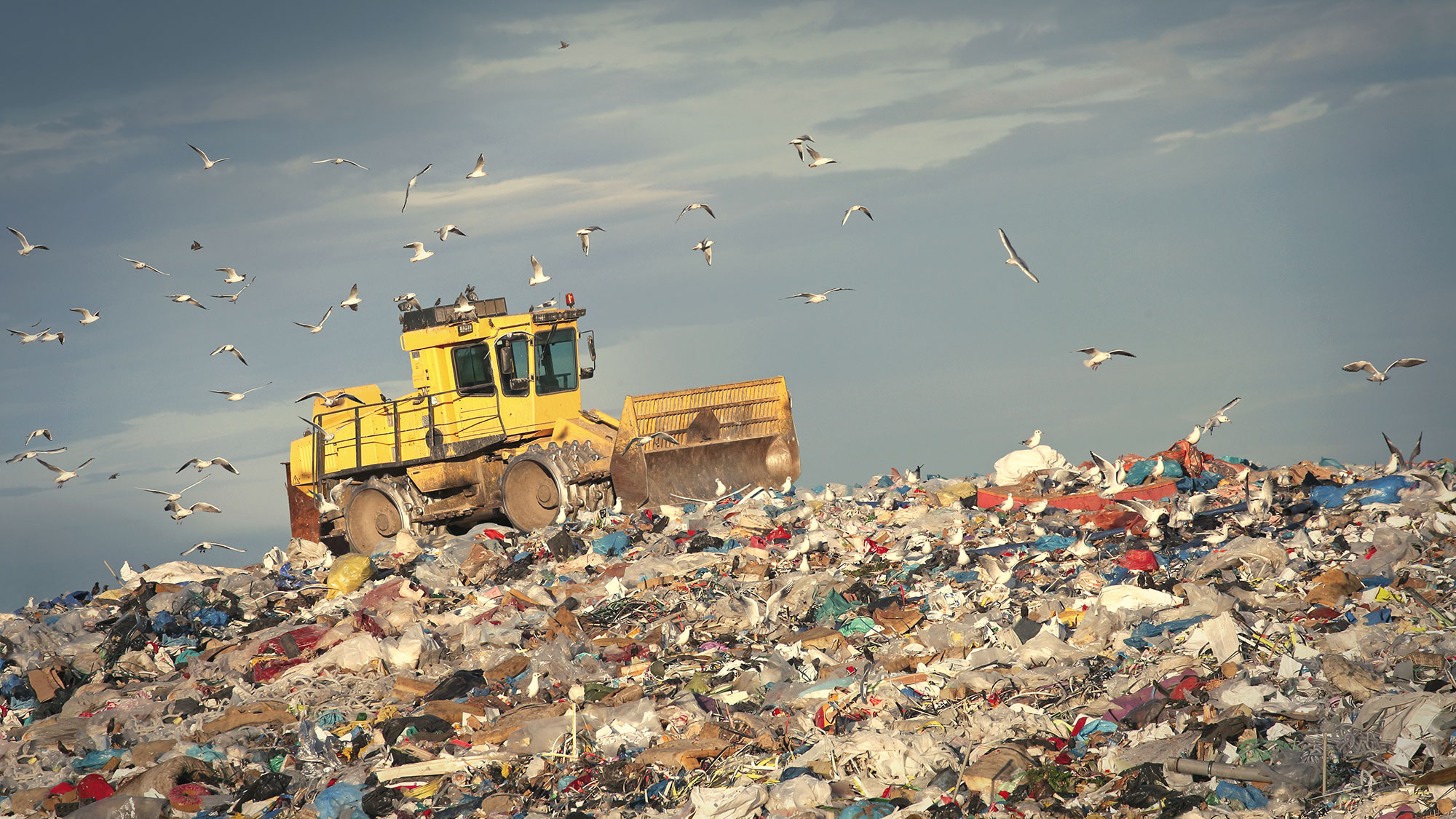Once a little girl roaming the vibrant fields of an organic lettuce farm in Kealakekua, Hawai’i, Ella Kilpatrick Kotner learned how to live in harmony with the land before most kids learn how to tie their shoes. Nourishing the soils that gave her a regular supply of leafy greens was just a part of life. As was playing with the piles of compost on her family’s farm.
“Composting, for me, is a lot about community,” said Kilpatrick Kotner. “It’s about connecting people to food and soil, and it’s about learning and being engaged in the process, and meeting your neighbors, and treating this thing that many people think of as a waste as a resource to be cherished and handled with care and turned into something beautiful that we can then reuse to grow more food.”
She now leads a program at Groundwork RI, a nonprofit in Providence, Rhode Island, that does just that.
Every day, her team of three bikes throughout the city, collecting food scraps from hundreds of households, which are then brought to a community garden. There, they mix pounds of nitrogen-rich food scraps otherwise destined for landfills with carbon-rich materials, such as dry leaves and wood shavings, while sifting out pieces of plastic and even the occasional fork. In doing so, Kilpatrick Kotner is creating a menu and a habitat for the microbes that prompt the decomposition process, transforming the waste into a spongy source of life for the soil. The compost is then made available to those enrolled in the subscription-based service to use in home gardens, yards, or urban farms.
The U.S. wastes over one-third of its food supply, which contributes considerably to global greenhouse gas emissions, primarily as a result of the methane that is released when food decomposes in landfills. A decade ago, the Obama administration set a national target to cut the nation’s food waste in half by 2030. Many observers expected the first Trump administration to ignore that goal because of the implicit climate focus, so it came as a surprise when Trump doubled down on the benchmark.
Not only did Trump officials participate in the 2018 U.S. Food Waste Summit, but his first administration also launched the first interagency agreement to reduce food loss and waste. That involved formal commitments to the 50 percent food waste reduction goal from the Environmental Protection Agency, the Department of Agriculture, and the Food and Drug Administration.
Without any federal enforcement mechanism, though, that ambitious goal has remained out of reach. Americans still waste about 300 pounds of food per person each year, roughly as much food as they did almost a decade ago. Trump’s reasoning, anyway, had more to do with protecting economic gains — food waste costs the U.S. hundreds of billions every year — than climate benefits.

In 2023, the EPA launched the Community Change Grants Program, a congressionally authorized program to support community-based organizations addressing environmental justice challenges, which funneled in about $2 billion of funding from the Inflation Reduction Act, or IRA. In December, Groundwork RI was 1 of 9 organizations included in an $18.7 million community change grant awarded to the Rhode Island Food Policy Council. A portion of the three-year funding stream was intended to provide the nonprofit with the resources needed to expand its collection service to neighboring cities, build a bigger compost hub, renovate their greenhouse with its pay-what-you-can farmstand, and add composting bin systems to more local community gardens. It also would have made it possible for Kilpatrick Kotner’s team to launch a free food-scrap collection pilot with the city of Providence.
Now, in his second term, President Trump has made no secret of the fact that his administration is working to unravel climate action and justice-oriented programs across the government — and make it harder for state initiatives to pick up the slack.
Last Thursday, after months of the Trump funding freeze uncertainty, the partners involved in the Rhode Island food-waste project learned that the $18 million grant was terminated. The EPA’s official notice, shared with Grist, informed the grantees that their project was “no longer consistent” with the federal agency’s funding priorities and therefore nullified “effective immediately.”
Zealan Hoover, a former senior adviser to President Joe Biden’s EPA Administrator Michael Regan, doesn’t believe that Trump is specifically targeting food-waste initiatives, but rather environmental justice programs in their entirety.
“It’s clear to me, from the terminations that have been going out, from the statements that have been made, in court filings, and to the press, that EPA is in the process of sending termination notices to every grantee in the Office of Environmental Justice,” said Hoover, who led the agency’s implementation of the bipartisan infrastructure law.
He noted that he believes the move to be “unlawful” as the IRA funding was allocated by Congress.
“As with any change in administration, EPA has been reviewing all of its grant programs and awarded grants to ensure each is an appropriate use of taxpayer dollars and to understand how those programs align with administration priorities,” an EPA spokesperson told Grist. “Maybe the Biden-Harris administration shouldn’t have forced their radical agenda of wasteful DEI programs and ‘environmental justice’ preferencing on the EPA’s core mission of protecting human health and the environment.” The spokesperson did not respond to Grist’s request for clarification about the agency’s legal authority to cancel the congressionally authorized community change grant.
Michelle Roos, executive director at the Environmental Protection Network, which is a national volunteer network of former EPA staffers, told Grist that around 400 grantees have now had their contracts terminated. The number of grants targeted was first released by the Senate Committee on Environment and Public Works at the end of March. A recently filed court document revealed the EPA is planning to terminate 781 grants in total.
According to Hoover, in prior administrations, it was “exceedingly rare” for the EPA to terminate grants. “This is a huge break from precedent that is pulling the rug out from underneath local communities,” he said.
Nessa Richman, executive director of the Rhode Island Food Policy Council, also questions how the administration can end the $18 million community change grant. The lead-up to the project took more than a year to develop and had garnered support from several state departments and the Department of the Navy. “It is a sinking feeling,” said Richman, “that this opportunity that we, and our partners, had worked so hard for, and that our state was so ready for, is slipping away.”
The money was set to create 27 new local jobs, provide food scrap pickup for more than 15,000 households, build 37 food scrap drop-off locations across Rhode Island, and develop nine compost processing facilities, including a larger-scale one on land owned by the naval station. What’s more, it would have launched a local supply chain for redirecting excess food from institutions like schools and restaurants to food-insecure community members instead of landfills. And it would have made Groundwork RI’s pickup collection model freely accessible to the community members they serve — not just to help fight food waste, but to also learn how to take better care of the soil as they grow their own food.
“It’s easier for folks who have a little bit of disposable income to buy that countertop composting food scrap collector, or that 5-gallon bucket, and buy a service that comes and picks up their food waste at their door. It’s easier for them than for people who are working three jobs to make ends meet to take the time to separate out that food waste,” said Richman. “The loss of the funding, in a real way, doesn’t just slow down the reduction of the food waste, but it further establishes a divide.”
Richman estimates that at the end of the three years, the project would have diverted over 11,000 tons of food waste from landfill, which in turn would have prevented more than 15,000 metric tons of emissions.
Hours after she read the notification of their grant termination, Richman met an old colleague at a local coffee shop in Rhode Island’s East Greenwich. It had been many years since they’d seen each other, and the two sat together, catching up until the shop closed.
As they talked for a while longer in the parking lot, Richman watched in frustration as one of the coffee shop’s employees carried two bags of perfectly edible pastries and threw them in the dumpster.
Source link
Ayurella Horn-Muller grist.org


